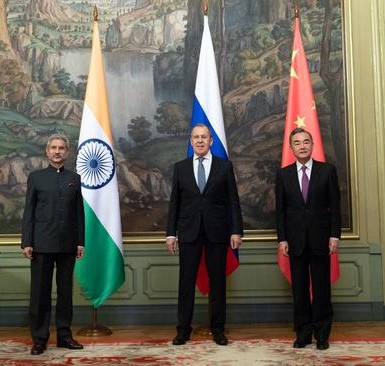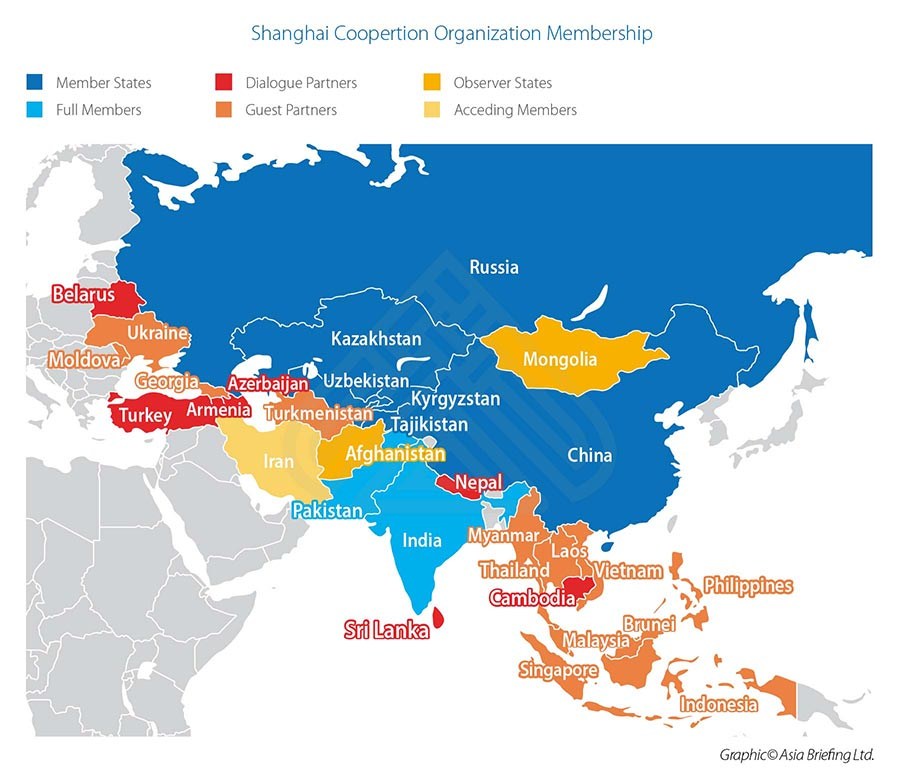SCO Moscow Summit: China & India To Stand Down Over Ladakh, Seven Cooperation Points, Talks About Post-Covid Economic Recovery
Op/Ed by Chris Devonshire-Ellis

The Foreign Ministers of the Shanghai Cooperation Organisation member states have been meeting in Moscow the past two days, with important face to face dialogues for the first time between India’s Subrahmanyam Jaishankar and China’s Wang Yi. The meetings were held with Russian Foreign Minister Sergey Lavrov.
As a result of the dialogue, both China and India have agreed to step down their military positions in Ladakh. A joint statement said the two sides had agreed to de-escalate.
“The border defence forces of both countries should continue dialogue, disengage as soon as possible, maintain the necessary distance, and ease the situation on the ground,” the statement said. China and India also agreed to “avoid actions that may escalate the situation”.
Chinese Foreign Minister Wang Yi laid out seven reference points for cooperation between China, India and Russia in a lunch speech following his meetings with Ministers Lavrov and Jaishankar.
“China, Russia and India share extensive and profound common interests and ideas, we are three big countries and major emerging economies with global influence. Faced with major changes and the global epidemic, we should strengthen mutual trust and jointly promote world peace and stability. China is willing to work with Russia and India to carry forward the spirit of openness, unity, trust and cooperation, build consensus, promote cooperation, and send a positive signal to the world to uphold multilateralism and join hands to meet challenges.”
Wang noted that there are always some doubts about the cooperation prospects of China, Russia and India, but first of all, the three countries have extensive and profound common interests and ideas, which the senior Chinese official summarized as follows.
First, China, Russia and India support the world’s multi-polarization, which is an inevitable trend in the development of human society, Wang said, adding that the democratization of international relations should be actively promoted for this purpose.
Second, the three countries support multilateralism, which represents the development direction of human civilization, Wang said, adding that the world cannot go back to the era of “the law of the jungle.”
Third, the three countries insist on maintaining the authority of international law, Wang said. In particular, the purposes and principles of the UN Charter and the Five Principles of Peaceful Coexistence should be strictly followed, he added.
Fourth, the three countries oppose interference in other countries’ internal affairs, he said. The internal affairs of a country should be decided by itself, and people of all countries have the right to choose their own development path.
Fifth, the three countries stand for conforming to the trend of globalization, Wang said. The stability of the global industrial chain and supply chain should be maintained, and globalization should be promoted toward inclusive and win-win development.
Sixth, China, Russia and India are all committed to national development and revitalization, Wang said. The development of the three countries is an opportunity for each other, and they should support and help each other, moving forward together on the road of development.
Seventh, the three countries support strengthening global governance, Wang said. The ability of international institutions to effectively respond to new threats and challenges should be improved to provide institutional guarantees for the modernization of global governance capacity.
“The above-mentioned common interests and concepts are an important political basis for China-Russia-India cooperation and are also the source of power for trilateral cooperation, Wang said, adding that the three countries can provide more positive energy and stability to the world by persisting in unity and cooperation.” Wang concluded.
The Shanghai Cooperation Organisation (SCO) is a Eurasian political, economic and security alliance and includes China, India, Kazakhstan, Kyrgyzstan, Pakistan, Russia, Tajikistan and Uzbekistan. Afghanistan, Belarus, Iran and Mongolia are observer members, while Armenia, Azerbaijan, Cambodia, Nepal, Sri Lanka and Turkey are dialogue partners. Guest attendees from ASEAN, the CIS, Turkmenistan and the United Nations also participate. The SCO is the largest regional organisation in the world in terms of geographical coverage and population, covering three-fifths of the Eurasian continent, includes just under half of the world’s total population and accounts for about 25% of global GDP.
There are also signs that the SCO is looking at expanding its reach and to develop as a counterbalance to the United States.
Russian Foreign Minister Sergey Lavrov stated his belief that partnership within the Shanghai Cooperation Organisation (SCO) was of growing importance amid the COVID-19 pandemic, as it helped efficiently overcome its political and socio-economic consequences. Lavrov noted at the SCO Foreign Ministers’ talks that the coronavirus pandemic had catalysed complex processes in global politics and economics and significantly affected the whole system of international relations, while putting intergovernmental cooperation and multilateral institutions to test.
“Robust experience of equal and fruitful cooperation in politics, security, economics and humanitarian issues and efficient mechanisms enable SCO to adequately respond to new risks and threats” Lavrov told attending Foreign Ministers “The significance of SCO’s huge potential is growing further under the current circumstances that require collective efforts and cooperation to overcome political and socio-economic effects of the COVID-19 pandemic.”
The minister said the meeting was taking place ahead of the 75th anniversary of the establishment of the United Nations (UN). “I believe it is important to discuss further steps to promote cooperation of the SCO with the UN, as well as increasing our organization’s contribution to a multipolar world order where the UN and its Security Council play a key role,” Lavrov added.
The SCO is expected to shortly grant Iran full membership status, while looking at upgrading observer nations to membership in the longer term. This is likely to include Turkey, giving the SCO another border with the European Union. At present the extent of the SCO reach looks like this:

Concerning the China-India regional security issues, given the seriousness of both the Covid-19 issue and the advent of an increasingly belligerent United States, it is likely that China and India have decided the mutual border demarcation issue is less a problem than dealing with the larger issues of the day. That implies the Ladakh and related issues can be expected to be put on the backburner for now while SCO economies struggle in the aftermath of the gobal pandemic and the now-constant threats of trade sanctions issued from Washington.
We can examine how this can realistically be expected to pan out as follows:
Covid-19: Healthcare
The most pressing issue is the Covid-19 pandemic and stopping its progress. India is the second-most affected country in the world (after the United States) while most attending nations have experienced serious outbreaks. Focus will be on organizing future potential border closures without having to compromise trade and cross-border supplies, as well as medical communications and data sharing, the movements of citizens, air connectivity and medical aid. Also on the agenda will be intelligence and cooperation concerning vaccine sharing and implementation, and in particular the Russian Sputnik V vaccine which is already being trialed in Russia, Belarus, India and some of the ASEAN nations.
China has also just announced Phase Three trials of its vaccine. Successful trials, mass vaccinations and how to get these into the SCO population at large – about 3.4 billion people.
The main issue concerning the vaccine is the sheer volume that is required. Both Russia and China have stated they can ramp up production to about 1 billion doses per annum, however this will take time. The implication of this is that while population clusters in major cities and among the general working population may be reached during 2021, only about 50% of the total SCO population can be reached in the short-medium term. As the so-called ‘herd immunity’ only kicks in after about 70% of the population is immune, this indicates that Covid-19 will be around in pockets for several years and quite possibly in rural areas.
Covid-19: Economy
Bilateral trade between all SCO members is down and economies have been battered. Foreign Ministers will want to balance healthcare concerns and measures against viable methods of developing and boosting trade. This will have a particular impact on the Eurasian Economic Union, which comprises SCO members Belarus, Kazakhstan, Kyrgyzstan and Russia, as well as the SCO dialogue partner Armenia. The EAEU has Free Trade Agreements with ASEAN members Singapore and Vietnam, while China has also signed off an EAEU FTA but is working on tariff reductions. India and several other ASEAN nations are also in negotiations with the EAEU over Free Trade. In order to reboot SCO economies and get trade flows restarted, trade incentives need to be introduced. Phased-in Free Trade Agreements via the Eurasian Economic Union are a distinct possibility, and only enhanced as SCO members seek to limit exposure to the United States.
Financial Security: De-Dollarisation
Further calls for technological advancements and improved financial integration are likely to actioned to counter the threat of United States sanctions. Russia, China, India and Iran are all well on the way to offering digital currencies and there will undoubtedly be moves made to resolve bilateral trade in non-US dollar denominated transactions between SCO members. Targets to limit US dollar use will probably be set and timeframes given to allow technologies and financial infrastructures to be put in place to bypass the US global banking and financial systems. This mechanism is already underway; China and Russia have decreased their use of the US dollar in bilateral trade from 97% to 46% in the past five years; this trend can be expected to continue and expand among SCO members.
Other Issues
Attending ministers also discussed the outcomes of the SCO Foreign Ministers Council, the preparations for the summit of UN Security Council permanent members, the cooperation within the UN, BRICS, RIC, the issues in the Asia-Pacific Region, the situation with the Joint Comprehensive Plan of Action on the Iranian nuclear deal regulation, the process of aligning integration initiatives on the Eurasian continent, and other current international topics.
Although the SCO meeting will not be covered in any great depth in Western or US media outlets, its growing influence is apparent to see. While it remains a dialogue and discussion forum, in today’s fracturing world the SCO elements of security and economic development are now starting to have a real potential impact on the future of both regional and global trade and should not be underestimated. Businesses investing in the Asian and Eurasian regions must pay attention to what is happening within blocs such as the SCO in order to plan for business strategies and upcoming trade and security developments.
Related Reading
- Belt & Road Initiative Military Strength On Display As Russian, Chinese, Indian & Central Asian Armies March At Moscow’s Red Square
- Shanghai Cooperation Organisation To Introduce ‘Mutual Settlement In National Currencies’ And Ditch US Dollar
About Us
Silk Road Briefing is written by Dezan Shira & Associates. The firm has 28 offices throughout Asia, and assists foreign investors into the region. For strategic advisory and business intelligence issues please contact the firm at silkroad@dezshira.com or visit www.dezshira.com





